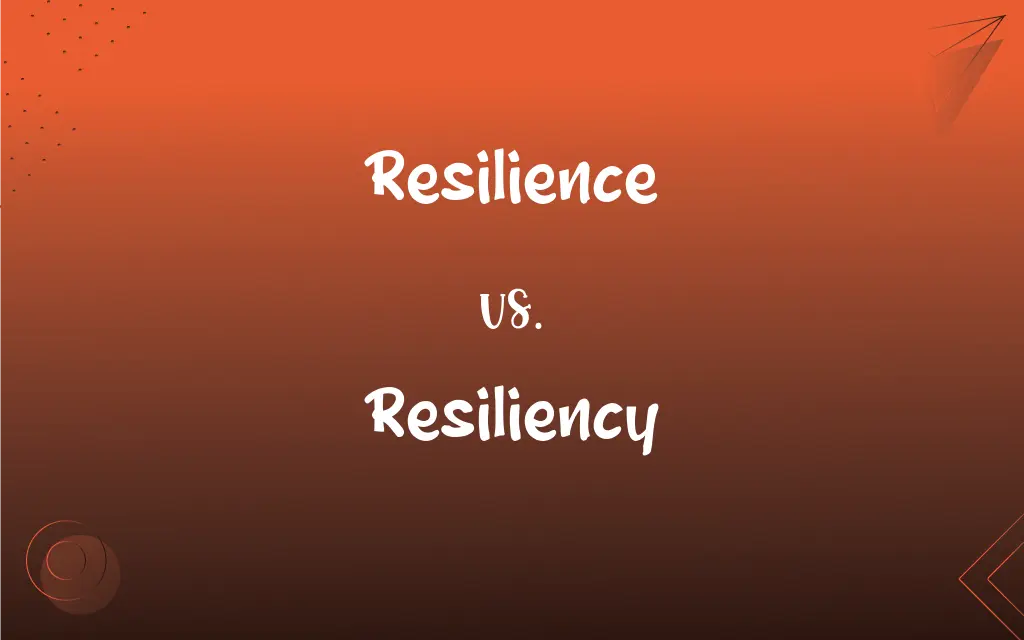Resilience vs. Resiliency: What's the Difference?
Edited by Aimie Carlson || By Harlon Moss || Updated on October 21, 2023
Resilience refers to the ability to recover from setbacks, while resiliency is the quality or state of being resilient.

Key Differences
Resilience is often used to describe the capacity of individuals, communities, or systems to bounce back from adversities. On the other hand, resiliency is synonymous with resilience but emphasizes the state or quality of being resilient.
Resilience can be thought of as an innate trait or developed skill allowing one to handle stress or challenges effectively. Resiliency, conversely, might be described as the degree or measure of that trait or skill in a person or entity.
In discussions about mental health or personal development, resilience often comes up as the ability to navigate life's ups and downs with grace. Resiliency, in the same context, might be used to address the enduring nature of that ability over time or across varied circumstances.
In material science, resilience is the capability of a material to absorb energy and return to its original shape after deformation. When discussing the same topic, one might use resiliency to talk about the consistent or reliable manifestation of this characteristic in the material.
Comparison Chart
Definition
The ability to recover from setbacks
The quality or state of being resilient
ADVERTISEMENT
Usage
Often refers to capacity or ability
Emphasizes the condition or quality
Context
Widely used in personal development and mental health
Sometimes more emphasized in material science
Popularity
Generally more common in usage
Less frequently used than resilience
Synonymity
Not always synonymous with resiliency
Typically synonymous with resilience
Resilience and Resiliency Definitions
Resilience
Mental or emotional strength in facing adversity.
She faced her diagnosis with remarkable resilience.
ADVERTISEMENT
Resiliency
The quality of easily recovering from adversity.
His resiliency in the face of challenges inspired many.
Resilience
The power or ability to return to the original position.
The resilience of the spring was tested under pressure.
Resiliency
The characteristic of a material that allows it to regain its shape.
The foam's resiliency was a key selling point.
Resilience
Endurance in challenging situations.
Years of hardship built his resilience.
Resiliency
The enduring nature of resilience over time.
She was admired for her lifelong resiliency.
Resilience
The capacity to recover quickly from difficulties.
The community showed great resilience after the natural disaster.
Resiliency
The state of being resilient in varied circumstances.
The team's resiliency was evident in multiple games.
Resilience
The ability of a substance to return to its original form after deformation.
The rubber's resilience allowed it to bounce back.
Resiliency
The ability to spring back into shape.
The mattress has impressive resiliency, making it comfortable.
Resilience
The ability to recover quickly from illness, change, or misfortune; buoyancy.
Resiliency
Resilience.
Resiliency
Synonym of resilience
Resiliency
An occurrence of rebounding or springing back
Resiliency
The physical property of a material that can return to its original shape or position after deformation that does not exceed its elastic limit
FAQs
What does resilience mean?
Resilience is the ability to recover quickly from setbacks or adversities.
How is resiliency different from resilience?
Resiliency emphasizes the state or quality of being resilient.
Which term is more commonly used: resilience or resiliency?
Resilience is generally more common in usage.
Is resilience innate or learned?
It can be innate, but many aspects of resilience can be learned and cultivated.
Can resilience be developed?
Yes, resilience can be nurtured and strengthened through experiences and coping strategies.
In which contexts is resilience commonly used?
It's used in mental health, personal development, and material science contexts.
Why is resilience important in mental health?
It helps individuals cope with challenges and bounce back from adversities.
Is resiliency a trait or a skill?
It can be both an inherent trait and a developed skill.
Is resiliency always about emotional strength?
No, it can also refer to physical properties, like in materials.
Can resilience be measured?
Yes, through various psychological assessments and tests.
Can communities, not just individuals, exhibit resilience?
Yes, communities can show resilience in the face of collective adversities.
How can one enhance their resiliency?
By facing challenges, seeking support, and developing coping strategies.
Are there physical examples of resilience?
Yes, like a rubber band stretching and returning to its original shape.
What factors contribute to personal resilience?
Factors include strong relationships, positive attitudes, and problem-solving skills.
Why might one choose to use resiliency over resilience?
Resiliency may be chosen to emphasize the enduring nature or state of being resilient.
How does resilience impact overall well-being?
Strong resilience often leads to better mental and emotional well-being.
Are resilience and persistence the same?
No, while both involve endurance, resilience focuses on recovery from setbacks.
How does resiliency relate to flexibility?
Both involve adaptability, but resiliency emphasizes recovery after challenges.
Does resilience only apply to negative events?
No, it can also apply to navigating positive changes or opportunities.
Do resilience and resiliency always mean the same thing?
Mostly, but resiliency often emphasizes the state or quality of being resilient.
About Author
Written by
Harlon MossHarlon is a seasoned quality moderator and accomplished content writer for Difference Wiki. An alumnus of the prestigious University of California, he earned his degree in Computer Science. Leveraging his academic background, Harlon brings a meticulous and informed perspective to his work, ensuring content accuracy and excellence.
Edited by
Aimie CarlsonAimie Carlson, holding a master's degree in English literature, is a fervent English language enthusiast. She lends her writing talents to Difference Wiki, a prominent website that specializes in comparisons, offering readers insightful analyses that both captivate and inform.
































































